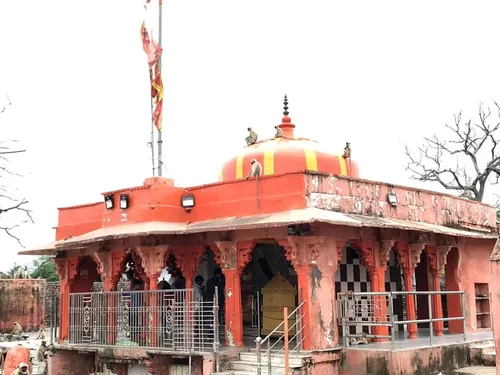
Dad Devi Temple, Kota: A Sacred Shrine with Rich Cultural Significance
The Dad Devi Temple in Kota, Rajasthan, is a revered Hindu temple dedicated to Dad Devi, a prominent local deity. Known for its spiritual significance and cultural heritage, this temple attracts devotees and visitors seeking blessings and insight into the rich traditions of Kota.
Location and Historical Context
- Location: Kota, Rajasthan, India
- Historical Context: Kota, an important city in Rajasthan, is known for its historical landmarks and religious sites. The Dad Devi Temple is a significant part of this heritage, representing the spiritual and cultural traditions of the region. It reflects the local religious practices and the deep-rooted beliefs of the community.
Architectural and Design Features
1. Traditional Temple Architecture
Architectural Style: The Dad Devi Temple features traditional Hindu temple architecture. This typically includes a sanctum sanctorum (garbhagriha), a pillared hall (mandapa), and a tower or spire (shikhara). The design is meant to facilitate worship and create a space for spiritual reflection.
Materials: Constructed using local materials, the temple exhibits traditional craftsmanship. The use of sandstone or marble is common in Rajasthan temples, providing both durability and aesthetic appeal.
2. Main Shrine
Deity Representation: The central deity of the temple is Dad Devi, a revered figure in the local community. The idol of Dad Devi is often adorned with traditional decorations and offerings. Devotees visit the shrine to seek blessings, offer prayers, and participate in rituals.
Decorative Elements: The temple may feature intricate carvings and artworks depicting various Hindu deities and mythological scenes. These artistic elements enhance the spiritual ambiance and showcase the craftsmanship of the time.
3. Temple Complex
Prayer Hall: The temple includes a prayer hall where devotees gather for worship and meditation. This space is designed to accommodate visitors and create a serene environment for spiritual activities.
Surrounding Environment: The temple is situated in a tranquil setting, contributing to its spiritual significance. The peaceful environment allows for contemplation and enhances the overall devotional experience.
Cultural and Spiritual Significance
1. Spiritual Hub
Devotional Practices: The Dad Devi Temple is a focal point for worship and spiritual practices. Devotees visit the temple to offer prayers, participate in religious ceremonies, and seek blessings from Dad Devi. The temple plays a central role in the religious life of the local community.
Festivals and Events: Major Hindu festivals and local events are celebrated with special ceremonies at the temple. These celebrations may include devotional services, processions, and community gatherings, reflecting the vibrant religious life of Kota.
2. Cultural Heritage
Local Traditions: The Dad Devi Temple is an integral part of Kota’s cultural and religious heritage. It represents the traditional practices and beliefs of the region, contributing to the preservation of local customs.
Historical Importance: The temple is a symbol of Kota’s historical and cultural landscape. It reflects the city’s religious diversity and the historical continuity of Hindu traditions in the region.
Visiting Dad Devi Temple
1. Planning Your Visit
Timings: The temple is generally open throughout the day, with specific timings for prayers and rituals. It is advisable to check the temple’s schedule and any special events before planning your visit.
Entry Guidelines: There may be no formal entry fee, but visitors should adhere to temple rules and guidelines. Dress modestly and maintain decorum to respect the sacred space.
Local Customs: Participating in local customs and observing the temple’s traditions will enhance your visit. Engaging with the community and learning about the temple’s significance can provide a deeper understanding of its role in local religious life.
2. Exploring the Area
Nearby Attractions: While visiting Dad Devi Temple, consider exploring other attractions in Kota, such as the Kota Garh (City Palace), Jagmandir Palace, and Seven Wonders Park. These sites offer additional insights into the region’s history and cultural heritage.
Local Markets: Kota’s local markets provide an opportunity to experience traditional Rajasthani crafts, textiles, and cuisine. Visiting these markets can offer a broader perspective on the region’s cultural and economic life.
Experience Divine Reverence
The Dad Devi Temple in Kota stands as a beacon of spiritual and cultural significance. Its traditional architecture, vibrant devotional practices, and rich heritage make it a key destination for those interested in exploring the religious and cultural landscape of Rajasthan.
Immerse yourself in the spiritual ambiance of Dad Devi Temple, where traditional beliefs and cultural heritage converge. Let the temple’s serene environment and vibrant community activities enhance your visit to Kota and provide a deeper appreciation of the region’s religious traditions.
